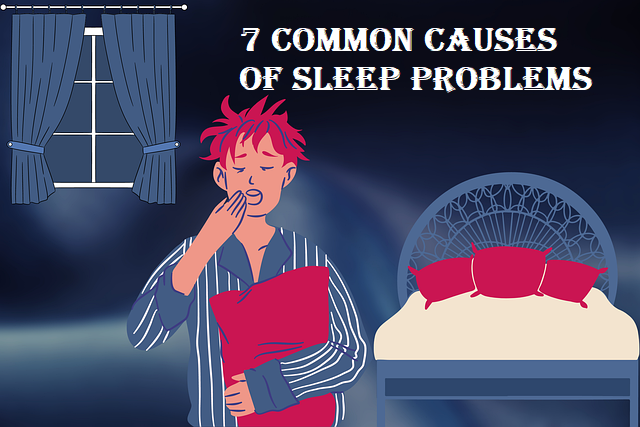Let’s check out What are the most common causes of sleep problems?

You might often find yourself always feeling sleepy or falling asleep during the day. Having difficulty sleeping, experiencing a noticeable decrease in performance, or feeling sudden mood swings. Although these things might sound like a normal event on a bad day. These are also common symptoms or sleeping problems.
But before you go and start searching for different sleep problem home remedies, medications, or treatments, you have to understand why sleep problems happen in the first place. After all, knowing what causes an issue can also help you make important life changes.
According to the American Sleep Association, an estimated 50-70 million adults are suffering from sleep disorders in the US alone. This shows how prevalent sleep problems are the need to address the growing numbers of the people affected around the world.
While some effects of sleep problems are not necessarily alarming for some, any issue should be handled seriously and responsibly as it can lead to more harmful impacts in the long run if left untreated.
As the famous saying goes, “prevention is better than cure”. Having the awareness of what you can do to avoid the serious effects of sleep disorders can save not only your life but also others.
And so, here are some of the most common causes of sleep problems to give you a headstart:
Most common causes of sleep problems
90% of people who suffer from depression also experience insomnia. Other mental disorders such as anxiety, obsessive-compulsive disorder (OCD), and posttraumatic stress disorder (PTSD) are also linked to sleep disorders.
Lack of sleep can cause different lifestyle disruptions. And these disruptions can affect your overall mental state and your ability to cope with them. Consequently, having mental problems can further trigger your sleep deprivation to persist.
Stress
Frequent or chronic stress can set your brain and body in a continuous state of alertness. Being alert will always prompt your brain to remain active which will give you difficulty sleeping at night.
This also means that the anxious thoughts you have at night worrying about a deadline, an incoming interview, or even life in general cause sleep deprivation. Sleep deprivation, when persisting continuously, can not only affect your performance but your overall health as well.
Poor Sleeping Habits
If you’re constantly struggling to try to sleep at night, you might be having poor sleeping habits. That gives your body a hard time adjusting to a healthy and proper sleeping routine.
For example, overconsumption of caffeine can put your body in a state of restlessness even during bedtime. It can also lead to stomach irritation, increased heart rate, and feeling of nervousness which all prevent your body to relax and prepare for a night’s rest.
Constantly pulling an all-nighter or sleeping late at night and not having a fixed sleep schedule also confuses your body clock to understand the times when it has to rest and when it has to be active.
Medical Conditions
Sleep has an important role in your physical well-being. Sleeping is where the repair processes of your body’s system happen. And lack of sleep is almost the same as preventing them to happen.
While sleep can greatly impact your health, medical conditions also affect the quality of sleep you get. As this can also be a way for your body to communicate that something is wrong. Conditions like chronic pain, cancer, diabetes, heart disease, asthma, gastroesophageal reflux disease (GERD), an overactive thyroid, are all linked to insomnia.
Environmental Disturbances
Environmental factors can also be preventing you from having quality and healthy sleep. You can try to evaluate your surroundings where you are sleeping. And identify which of them are giving you difficulties sleeping.
This might be a hard and old mattress that gives you the worst back pain, an uncomfortable room temperature that is either too hot or too cold, a noisy neighbor that goes on until midnight, or sleeping next to a loud snorer.
While these situations are considered normal for anyone, the implications they have can be more serious for others. If you are experiencing any of these and more, taking the important steps and making the right decision will serve you well in long run.
Neurological Disorders
Alzheimer’s disease, epilepsy, neuromuscular disorders, Parkinson’s disease, and other movement disorders, and stroke are some of the neurological conditions that mostly come with sleep disorders.
When sleep disorders are diagnosed and treated by professionals, neurological examinations are also conducted to see any irregularities in brain functions. Both sleep and wakefulness are activities important in brain function. And so suffering from neurologic disorders can also disrupt sleep for patients.
Aging
Sleep problems such as apnea and insomnia are prevalent among the elderly. It was revealed in studies that 40% of elderlies are suffering from sleep difficulties.
One of the most known conditions they suffer from is having changes in sleep patterns. Where they sleep for a short period and remain awake at night or early in the morning. The average total sleep time for elderlies also decreases to 6.5 to 7 hours a night.
Changes in melatonin and cortisol can also contribute to the disrupted sleeping patterns as you produce less of them as you age.
Key Takeaway
Sleep is an important aspect of life and thus being concerned about changes in your sleep patterns or how your body reacts to it should be normal. As it is also one of the biggest contributors to good health. It is encouraged to evaluate your lifestyle and its relationship with the sleep you are getting.
Sleep deprivation is a worldwide issue that almost cripples adults to function productively in society. Therefore understanding factors such as having mental, medical, and neurological conditions, environmental disturbances, stress, poor sleeping habits, and aging and how they can lead to serious sleep issues is warranted.
Also check out: Top 10 Home Remedies to remove dark circles
Was this helpful?
0 / 1